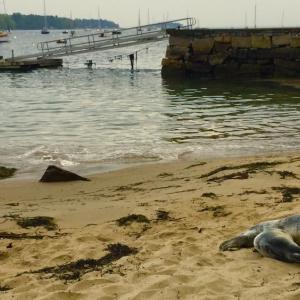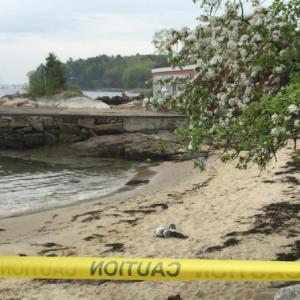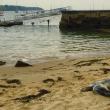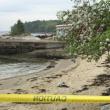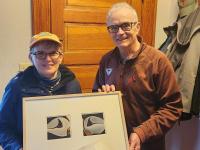Seal pups rest at Rockport Harbor beach, public urged to let them be
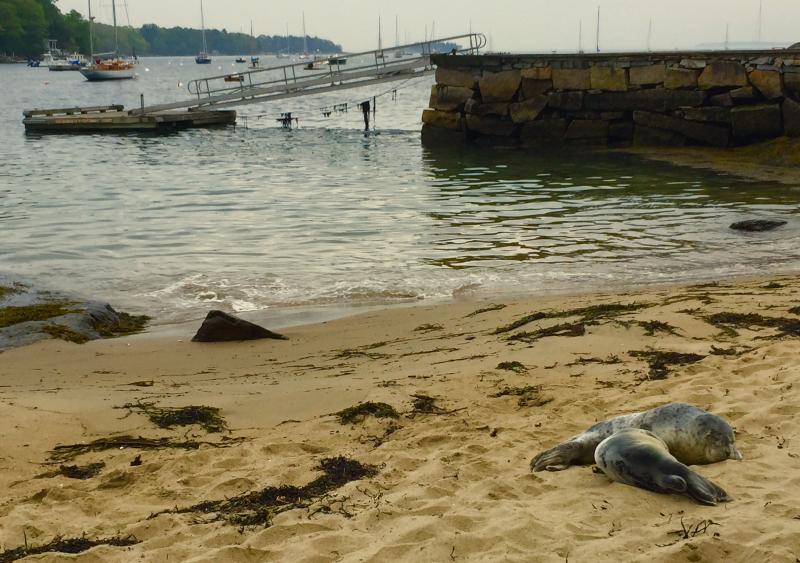 Two Harbor Seal pups are hanging out on Goodie’s Beach this morning in Rockport, May 28. The beach is closed to people and dogs. (Photo by Lynda Clancy)
Two Harbor Seal pups are hanging out on Goodie’s Beach this morning in Rockport, May 28. The beach is closed to people and dogs. (Photo by Lynda Clancy)
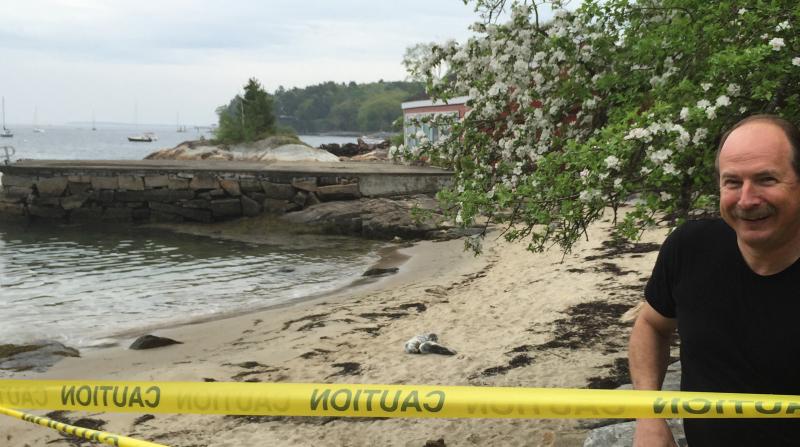 Rockport Public Works Director Mike Young closed off Goodie’s Beach with tape to let the seals have the beach to themselves. (Photo by Lynda Clancy)
Rockport Public Works Director Mike Young closed off Goodie’s Beach with tape to let the seals have the beach to themselves. (Photo by Lynda Clancy)
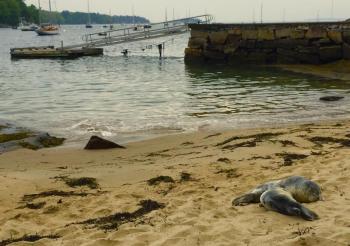 Two Harbor Seal pups are hanging out on Goodie’s Beach this morning in Rockport, May 28. The beach is closed to people and dogs. (Photo by Lynda Clancy)
Two Harbor Seal pups are hanging out on Goodie’s Beach this morning in Rockport, May 28. The beach is closed to people and dogs. (Photo by Lynda Clancy)
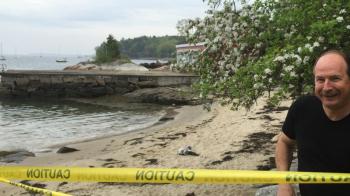 Rockport Public Works Director Mike Young closed off Goodie’s Beach with tape to let the seals have the beach to themselves. (Photo by Lynda Clancy)
Rockport Public Works Director Mike Young closed off Goodie’s Beach with tape to let the seals have the beach to themselves. (Photo by Lynda Clancy)
ROCKPORT — Goodie’s Beach, at Rockport Harbor, is closed this morning while two seal pups enjoy a rest in the sand. They seem to be fine, according to Harbor Master Abbie Leonard. They are alternating between napping and batting each other over the head with their flippers.
“Everything I have learned in training is to leave them alone,” said Leonard, Wednesday morning, May 27. “Usually it will be a tide cycle and they will go on their way.”
Leonard is currently getting trained in how to respond to marine mammal emergencies through Allied Whale, at the College of the Atlantic.
“I will monitor them,” said Leonard.
Meanwhile, she is instructing the public to leave them alone, and keep dogs at bay.
Allied Whale is authorized by the federal National Oceanic and Atmospheric Administration to respond to marine mammal emergencies and strandings. Allied Whale’s region includes Rockland north to the Canadian border.
Southward, the Marine Animal Rehabilitation Center (MARC) at the University of New England in Biddeford, operates the only rehabilitation facility in Maine.
This is the season for harbor seal pups to land on rocks and outcroppings along the coast. Harp and Hooded seals generally precede them in their propagation cycle late in the winter.
Leonard is instructing the public to respect the pups at Goodie’s Beach and stay away from them.
It is illegal under the Marine Mammal Protection Act to disturb or harass seals and other marine mammals.
In all cases of marine animals, do not disturb or attempt to drive the animal back into the water, stay back at least 50 feet, and prevent further harm to the animal by restraining pets and keeping other people from approaching it, according to the Marine and Environmental Research Institute in Blue Hill.
“It is important not to disturb seals from late-April through June while harbor seals are pupping and nursing,” the Institute said. “During the early weeks of life, newborn seals are at risk of becoming separated from their mothers by wave surges, illness, predators, or disturbance by people, especially boaters. Kayakers, boaters and picnickers should be careful to stay away from pupping ledges. Approaching boats can ‘flush’ seals from haulout ledges into the water, often separating mothers from their newborn pups. In many cases, these pups become stranded on local beaches and require emergency intervention to survive. According to a recent study, this ‘flushing’ reaction is highest when seals are approached by kayaks and canoes (84 percent), followed by motor boats (74 percent). Kayak and tour groups should contact the Institute to learn which areas to avoid.”
Marine Mammals of Maine
Stranding Hotline - 1-800-532-9551
Allied Whale/College of the Atlantic
Bar Harbor, ME
Stranding Hotline - 207-288-5644
Marine Animal Rescue Center (MARC) University of New England
Biddeford, ME
Stranding Hotline - 207-288-5644
NOAA Fisheries Northeast
Gloucester, MA
Stranding Hotline – 978-281-9351
New England Aquarium
Boston, MA
Stranding Hotline – 617-973-5247
Mystic Aquarium
Mystic, CT
Stranding Hotline – 860-572-5955
Riverhead Foundation for Marine Research
Riverhead, NY
Stranding Hotline – 631-369-9829
Marine Mammal Stranding Center
Brigantine, NJ
Stranding Hotline – 609-266-0538
Marine Education, Research, and Rehabilitation Institute
Nassau, DE
Stranding Hotline – 302-228-5029
Maryland Department of Natural Resources
Oxford, MD
Stranding Hotline – 800-628-9944
Virginia Marine Science Museum
Virginia Beach, VA
Stranding Hotline – 757-437-6159
Event Date
Address
United States

